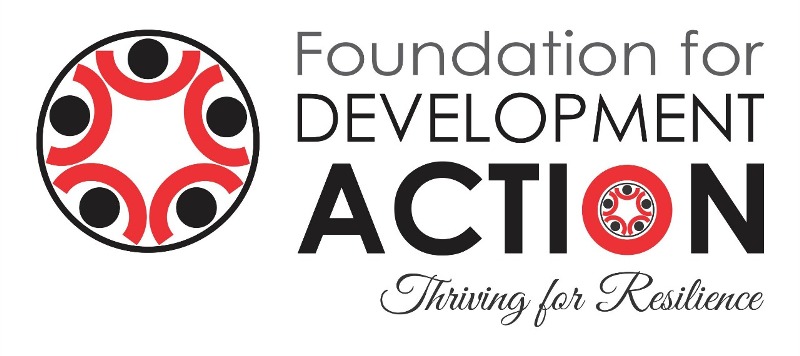DISASTER RISK REDUCTION
India is a multi-hazard prone country, be it natural or anthropogenic. According to NDMA (National Disaster Management Authority), 80% of India’s geographical area is vulnerable to disasters of different kinds. The intensity and frequency of disasters over the years are increasing resulting in larger number of people losing their lives, livelihoods, property and people becoming homeless, orphaned. Foundation for Development Action works with vulnerable communities to build resilience, foster adaptability, respond to and manage disaster risks effectively at local level by enhancing community and institutional capacities.
Community Based Disaster Risk Management Programme (CBDRM)
FDA implemented Community Based Disaster Risk Management (CBDRM) programme at Munroethuruthu in Kollam and Peringara in Pathanamthitta districts under ‘GoI-UNDP Project on Enhancing Institutional and Community Resilience to Disasters and Climate Change 2013-17’, with support from Kerala State Disaster Management Authority (KSDMA).
FDA conducted consultation meetings with people’s representatives and officials of Grampanchayat, Revenue and Disaster Management department and other key persons in the villages to share objectives and end results of the intervention. Vulnerable areas of the Grampanchayat were made into zones and community level awareness and sensitization meetings were organised, Village Disaster Management Committees (VDMC) and Emergency Response Teams (ETR’s) namely; Search and Rescue; First Aid and Shelter Management were formed and specialised hand-on trainings were imparted to village volunteers in their respective domains.
Mapping exercises using Participatory Learning and Action (PLA) tools were adopted to prepare Resource Map, Hazard Map and Evacuation Map with people’s participation. Participatory Capacity Vulnerability Assessment was conducted in the Grampanchayat to understand in detail and depth of hazards and vulnerabilities that exists in the village and what capacities are needed to minimize risks. As part of the intervention, Village Disaster Management Plans were prepared and has been submitted to District Disaster Management Authorities of Kollam and Pathanamthitta for approval.
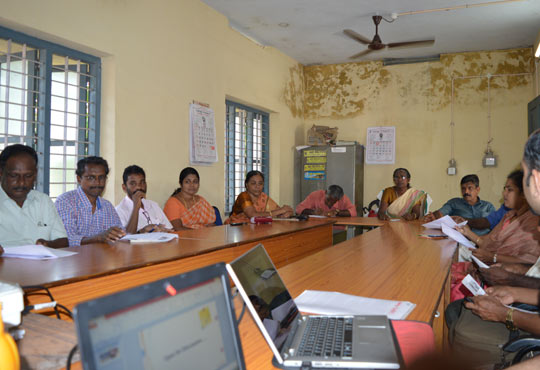
Consultation meeting with Grampanchayat, Munroethuruthu
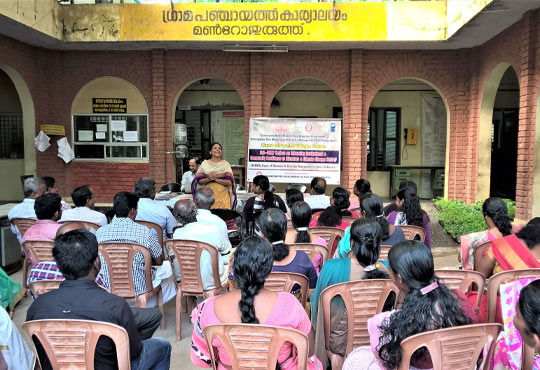
Community consultation programme, Munroethuruthu
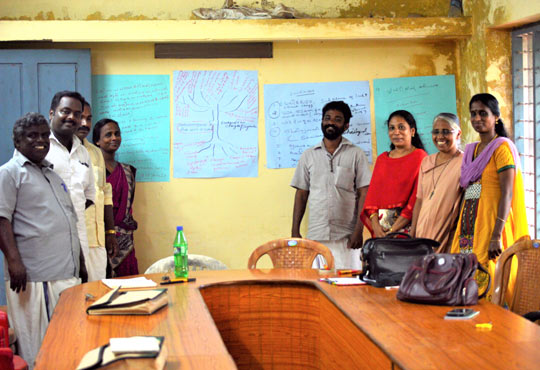
Participatory Learning and Action Programme, Munroethuruthu
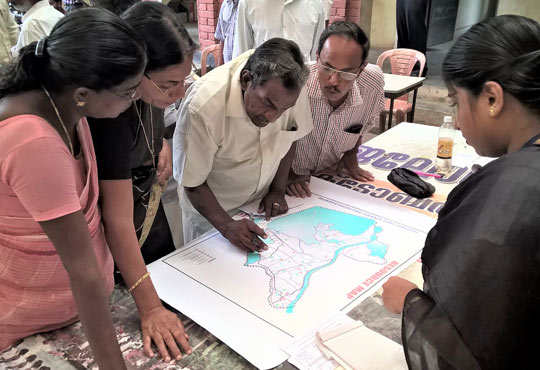
Participatory Mapping Exercise, Munroethuruthu
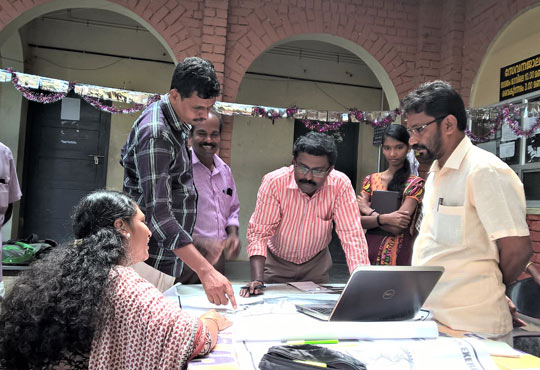
Map verification exercise with community, Munroethuruthu
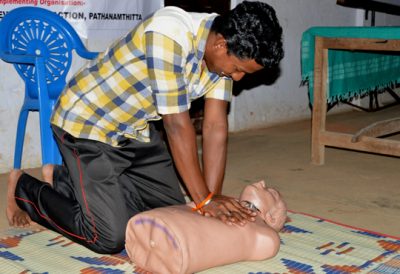
A male volunteer practicing Cardio Pulmonary Resuscitation (Adult), Munroethuruthu
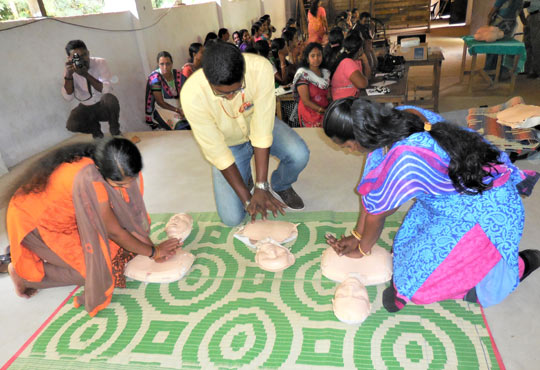
Female volunteers practicing Cardio Pulmonary Resuscitation (Adult), Munroethuruthu
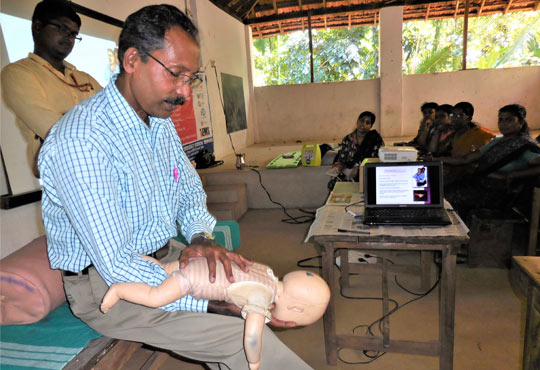
Demonstration of CPR in infant by BLS master trainer, Munroethuruthu
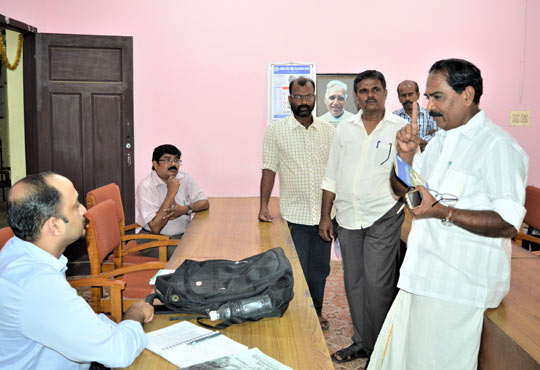
Consultation meeting with PRI members, Peringara
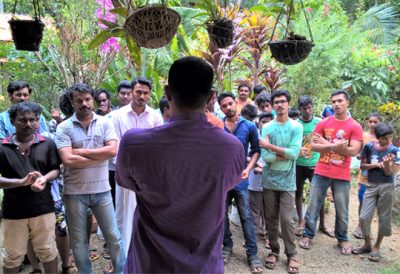
Kerala Fire & Rescue Officer sharing tips on water rescue methods to village volunteers, Peringara
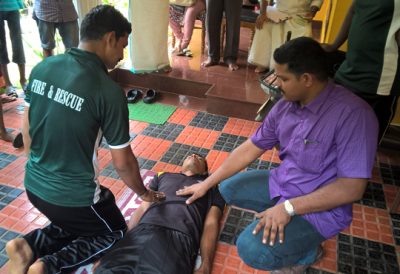
Master trainers of Kerala Fire & Rescue Services demonstrating first aid to a drowning victim, Peringara
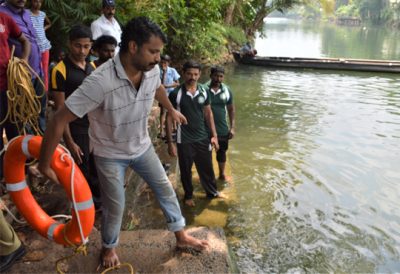
A volunteer practising water rescue method (Throw), Peringara
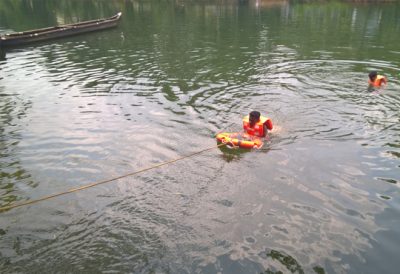
Demonstration of water rescue method (Throw), Peringara
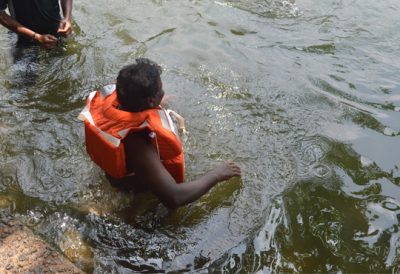
A volunteer being trained in Search & Rescue in a flood like situation, Peringara
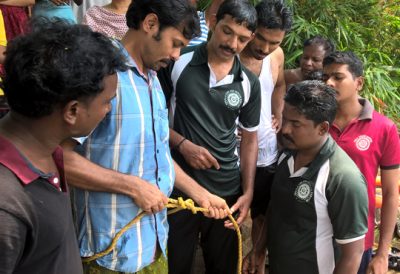
Master trainers of Kerala Fire & Rescue Services helping a volunteer to learn rescue methods using rope, Peringara
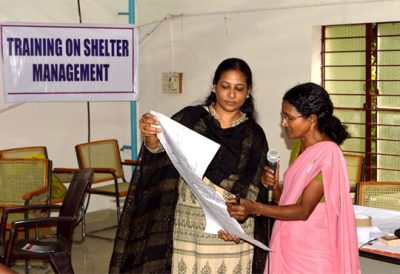
Training on shelter management, Peringara
Campus Disaster Management Programme, SOS Children’s Village Thrissur, Kerala
The devastating earthquake which hit the Himalayan nation of Nepal on 25th April 2015, caused heavy casualties by killing more than 8,659 people and injuring 21,952 plus people. This disaster triggered Save Our Soul (SOS) International to think and initiate Disaster Risk Reduction programmes in all SOS villages with the objective to ensure safety and security of children living in moderate and high-risk earthquake zones. FDA provided technical assistance to SOS Children’s Village, Thrissur in developing their Campus Disaster Management Plan in a participatory manner. Children, mothers and staffs were trained in earthquake risk mitigation and fire hazards. Children were formed into various groups and were trained to conduct ‘Hazard Hunt’ for identifying factors of hazards and vulnerabilities of their campus. Resource / Social Map; Hazard Map and Evacuation Map were prepared by children themselves by using Participatory Learning Action tool.
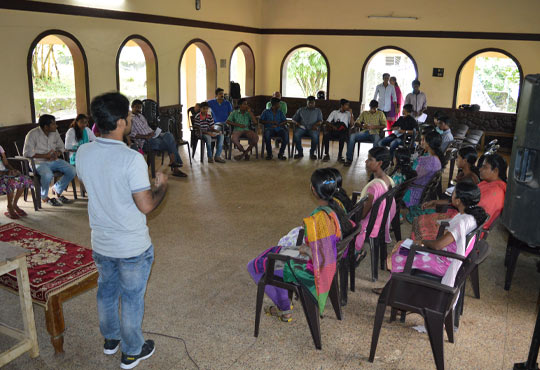
SOS staff delivering opening remarks on Campus Disaster Management Programme
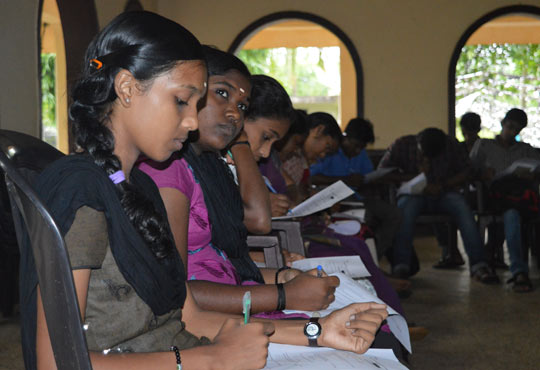
Children attending pre-test on earthquake risk management
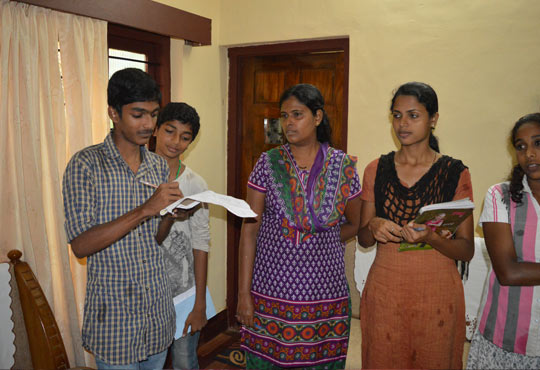
Children engaged in Participatory Hazard Hunt Exercise
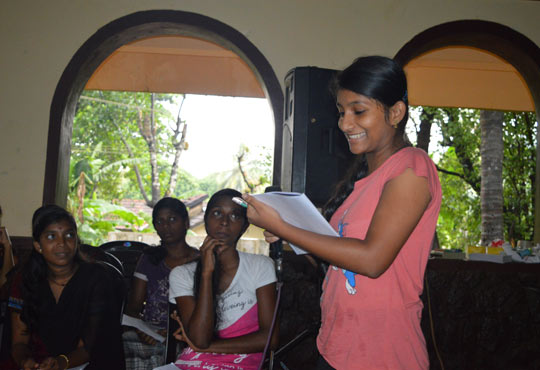
A child sharing her experience of Campus DM Plan development
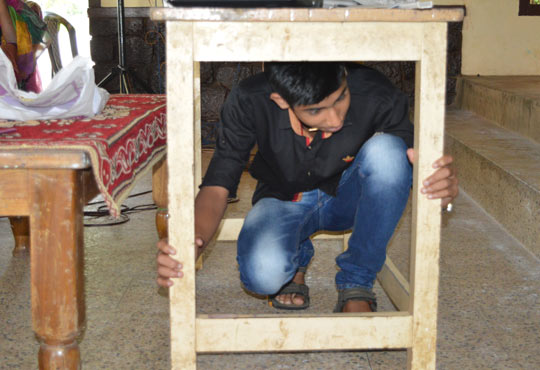
A child practising Drop-Cover-Hold (DCH) during a session on earthquake preparedness
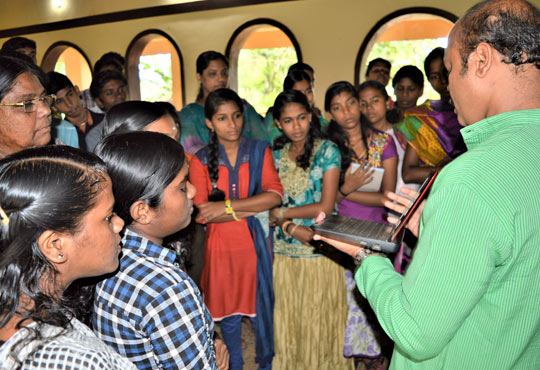
Trainer providing orientation on Participatory Learning and Action (PLA) tool
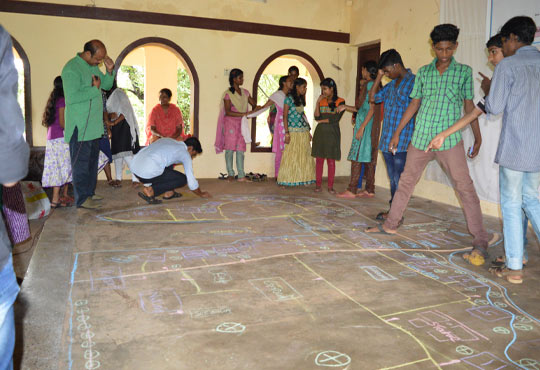
Participatory Mapping Exercise
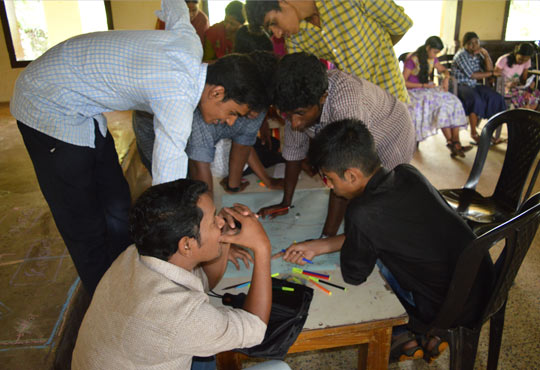
Children copying maps on flip chart
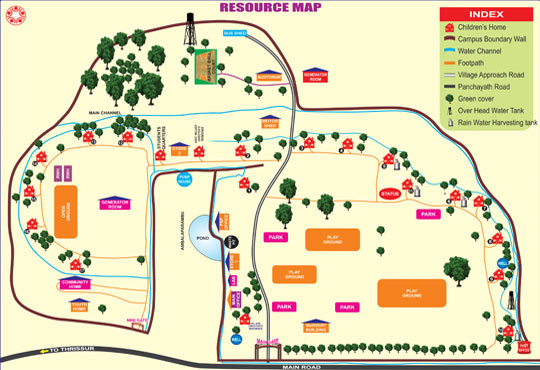
Resource map of SOS Children’s village, Thrissur
School Safety Programme
Children spent most of their time in school, pursuing education, interacting with teachers, playing with peer group and hence school should be a safe place for the children at the same time schools are also exposed to a number of risks. FDA has taken concrete steps to build capacities of schools to manage and cope with hazards which are of prime importance. School safety is therefore an approach and method to ensure resilience towards creating a safer environment for children to learn and prosper in all it’s potential.
School Safety Programme, Saraswathi Vidyalaya, Thiruvananthapuram
In April 2018, Foundation for Development Action started working with Saraswathi Vidyalaya – a CBSE affiliated school at Thiruvananthapuram having 3334 students, 129 teachers and 156 non-teaching staffs. A comprehensive School Safety Programme was implemented by following School Safety Guidelines of National Disaster Management Authority, GoI. A number of capacity building programmes like; training on Safe Driving Practices for school bus drivers & helpers; training on Rescue & Basic Fire Fighting Techniques and Basic Life Support for teachers, school bus drivers & helpers, security staffs, Aaya (lady helpers) and students; training on Stress Management and Life Style Diseases for school bus drivers & helpers; participatory mapping and hazard hunt exercises involving students and teachers; awareness generation programme on school safety and basics of disaster risk reduction; mock drill on fire and school bus accidents and development of School Disaster Management Plan are notable highlights of the School Safety Programme.
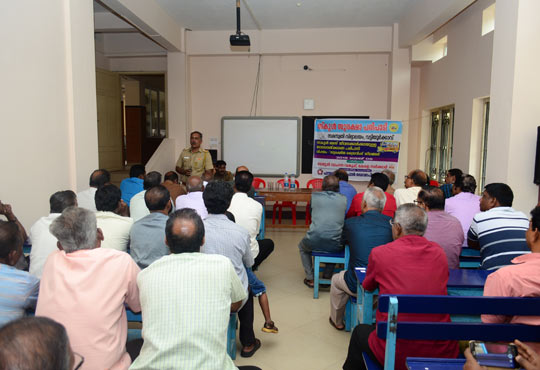
Orientation on safe driving practices for school bus drivers and conductors
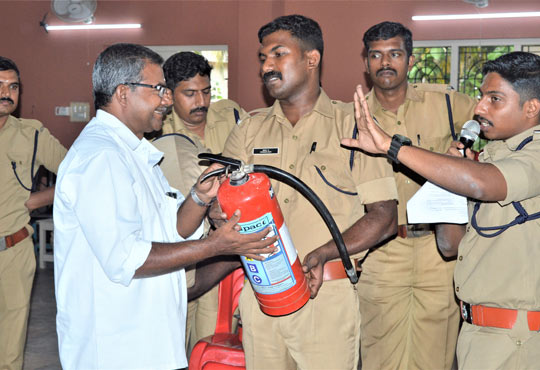
Training on operating fire extinguisher for non-teaching staff
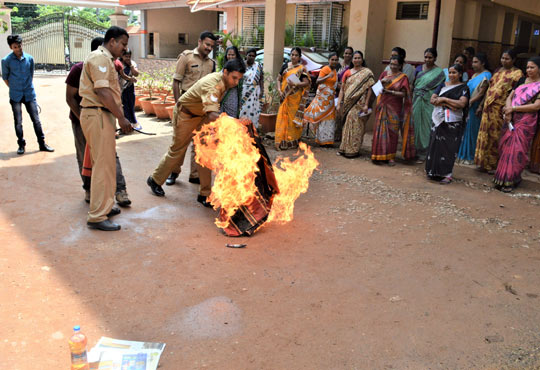
Demonstration of management of fire in cooking gas cylinder
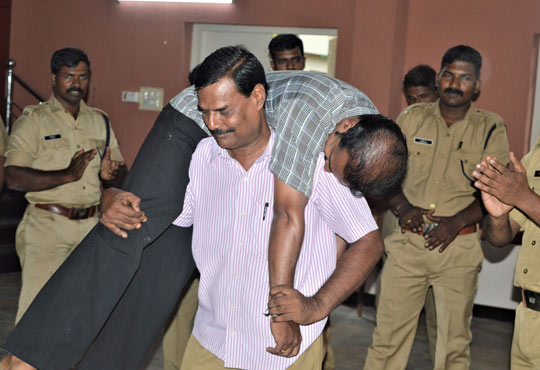
School bus driver practicing rescue method (firemen lift)
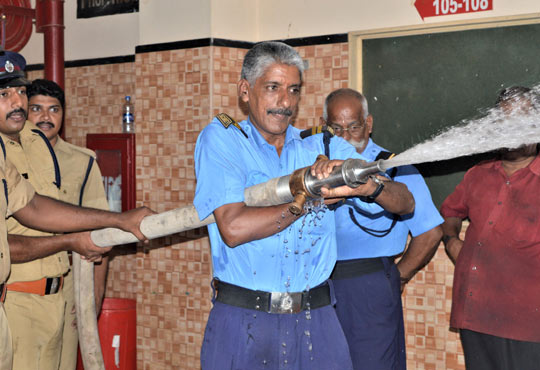
Security staff practising use of fire hose pipe
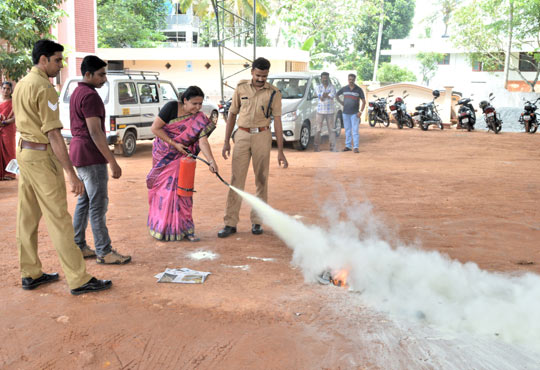
Lady staff (Aaya) practising how to use a fire extinguisher
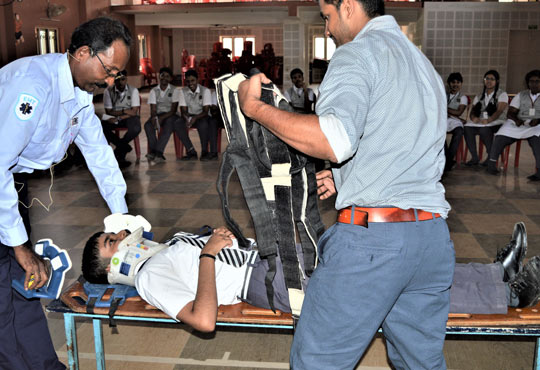
Management of victims of road accident
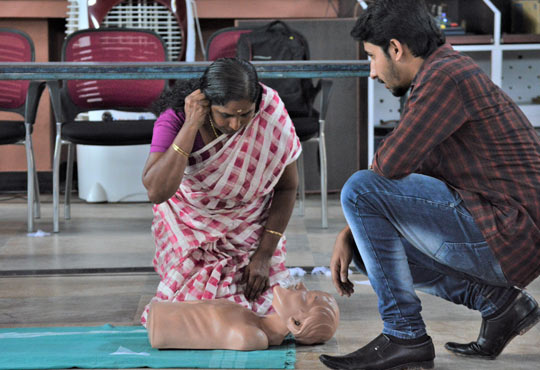
A non-teaching staff practising Cardio Pulmonary Resuscitation (Adult)
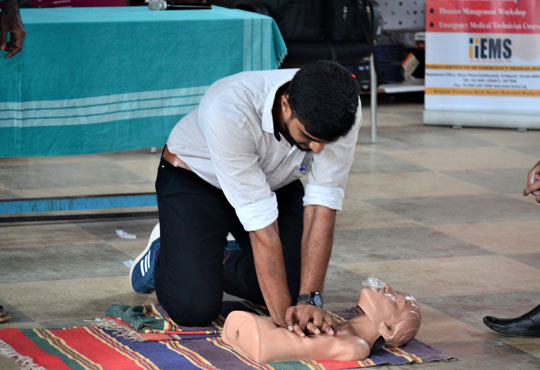
A teacher practising Cardio Pulmonary Resuscitation (Adult)
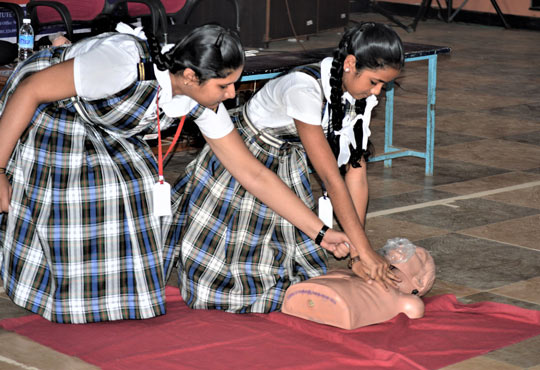
Students practising Cardio Pulmonary Resuscitation (Adult)
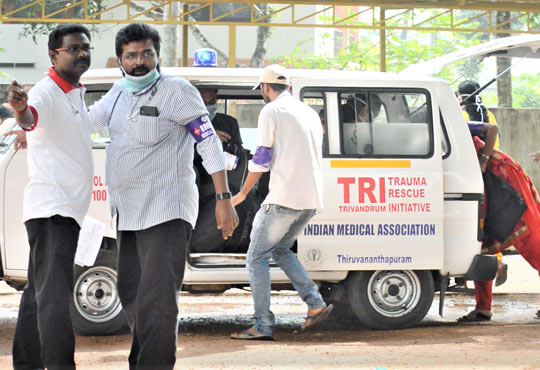
Fire mock drill – Ambulance engaged in medical evacuation of victims
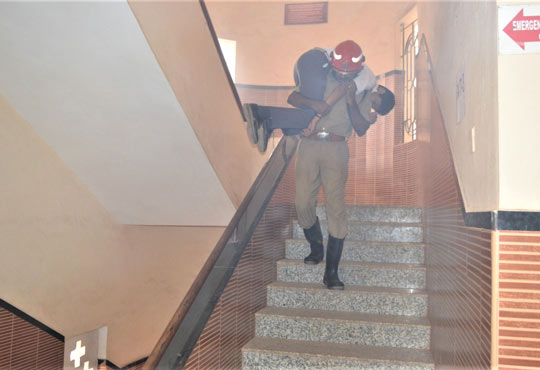
Fire mock drill – Rescuing a victim by adopting firemen lift method
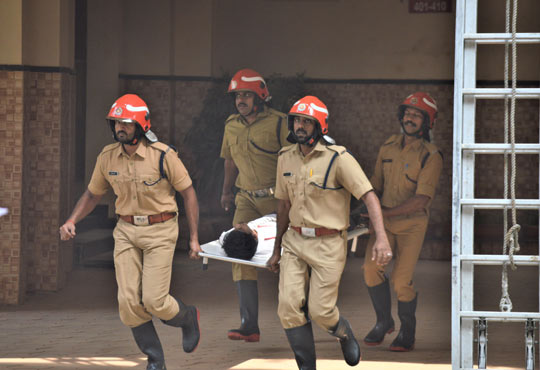
Fire mock drill – Victims being rescued in stretcher by four firemen
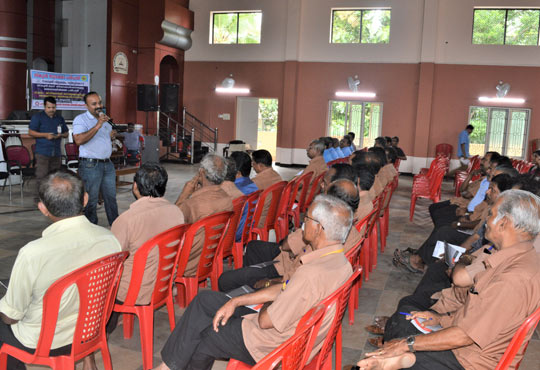
Sensitization programme on Management of Life Style Diseases for school bus drivers and conductors
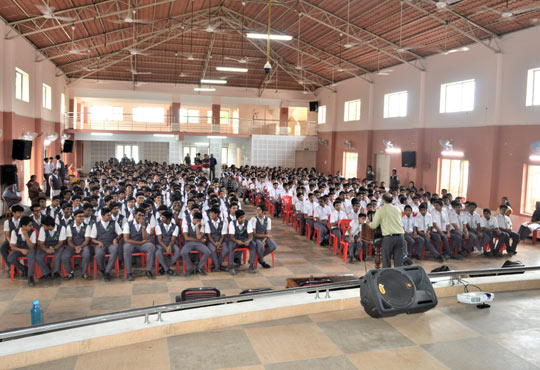
Orientation programme on basics of Disaster Management for students
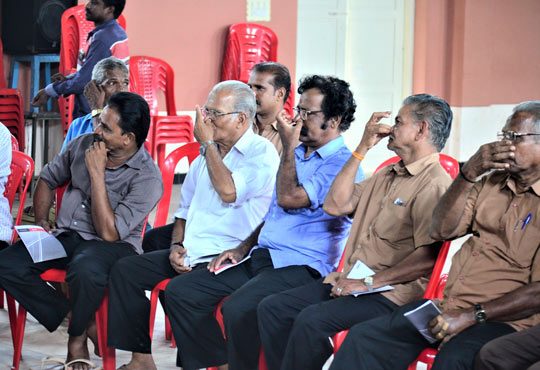
Training on stress management for school bus drivers and conductors
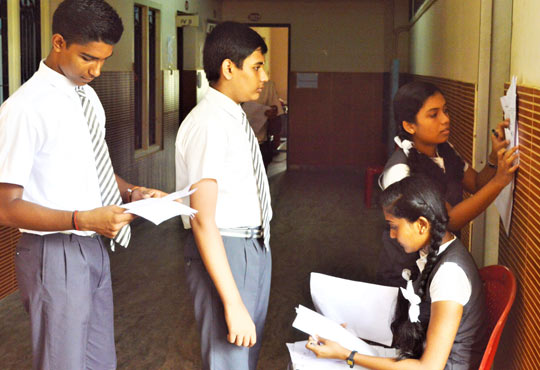
Students engaged in Participatory Hazard Hunt Exercise
School Safety Programme in 28 schools supported by UNDP
Foundation for Development Action during October – December 2019 had implemented a school safety programme in 28 schools (Pan Kerala) which was a joint programme of United Nations Development Programme (UNDP) and Kerala State Disaster Management Authority (KSDMA). The project was implemented in association with the General Education Department, Govt of Kerala and supported by Kerala Fire & Rescue Services and Indian Institute of Emergency Medical Services for imparting capacity building training programmes. Highlights of the project include formation and capacity building of School Disaster Management Committee; formation of School Emergency Response Team (S-ERT) for Basic Life Support and training to its members and students; participatory Resource-Hazard and Evacuation map preparation, hazard hunt exercise, fire mock drill, development of module for BLS training and School Disaster Management Plan in vernacular.
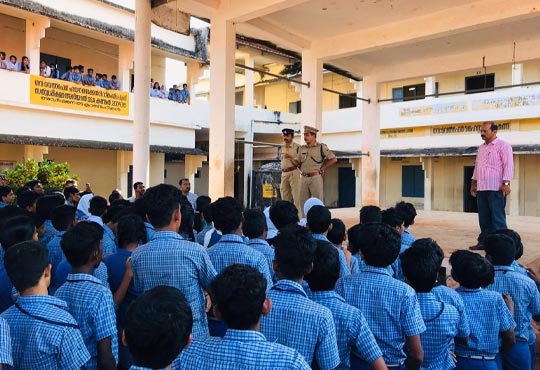
Students attending orientation on School Safety
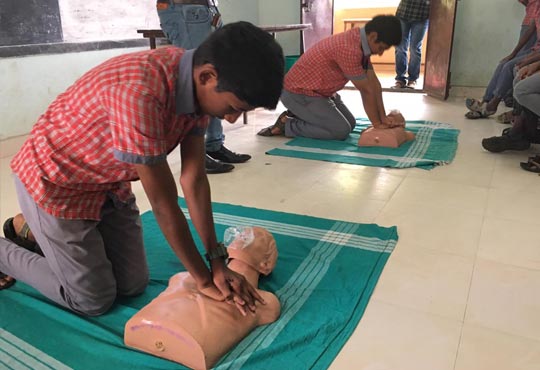
Students practicing Cardio Pulmonary Resuscitation (Adult)
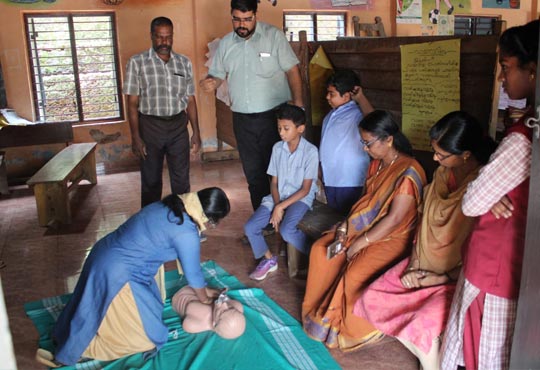
Teacher practicing Cardio Pulmonary Resuscitation (Adult)
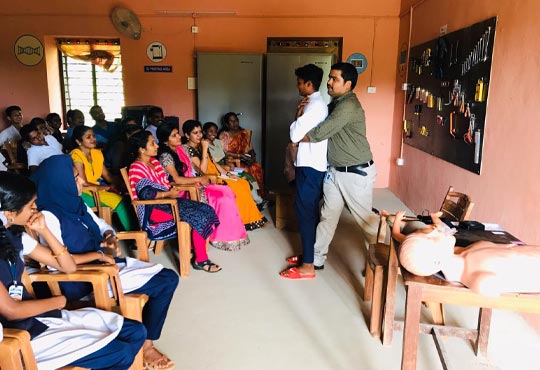
Demonstration of Heimlich Maneuver (Chocking)

Students practicing Cardio Pulmonary Resuscitation (Infant)
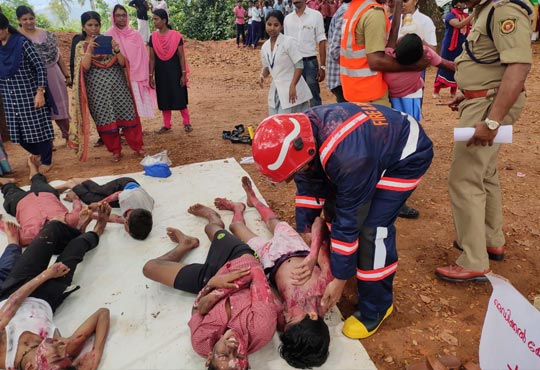
Fire Mock Drill – Victims brought to medical corner
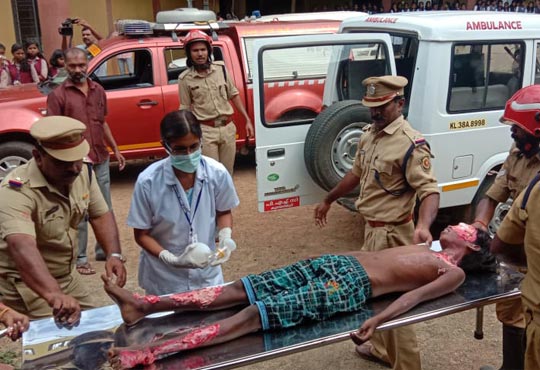
Fire Mock Drill – Severely burnt child rescued from a building
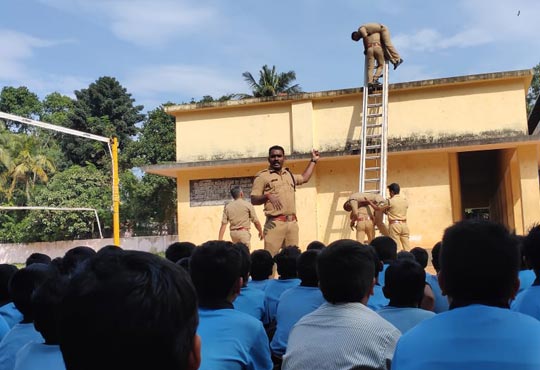
Fire Mock Drill – Demonstration by firemen
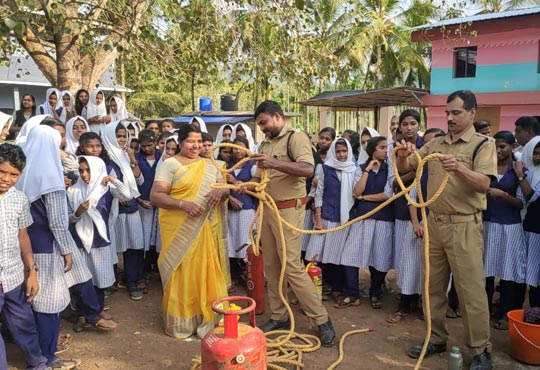
Fire Mock Drill – A teacher being trained in preparing rescue knots
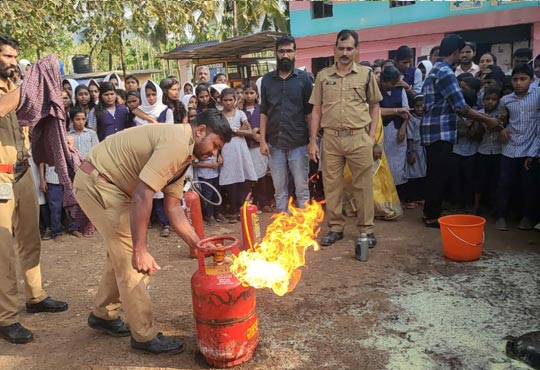
Fire Mock Drill – Demonstration of management of fire in cooking gas cylinder
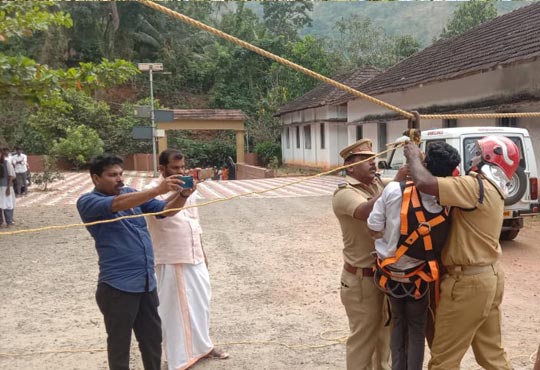
Fire Mock Drill – A student being rescued using rope
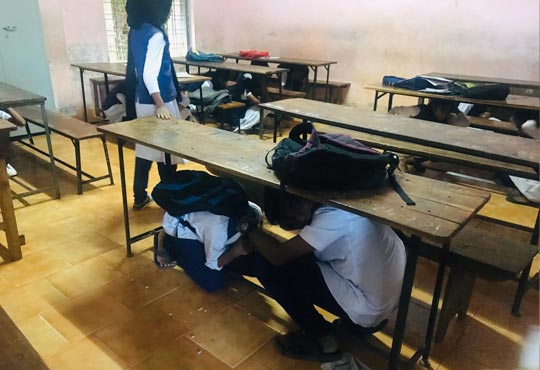
Student practicing Drop-Cover-Hold (DCH)
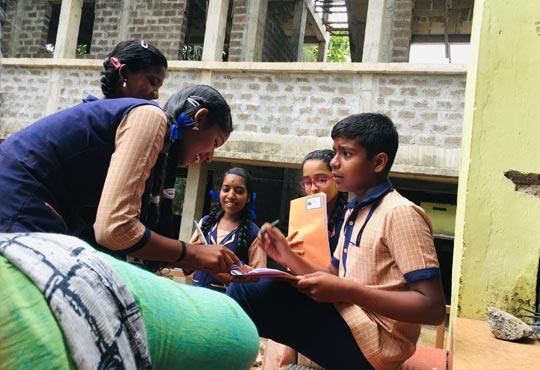
Students engaged in Participatory Hazard Hunt Exercise
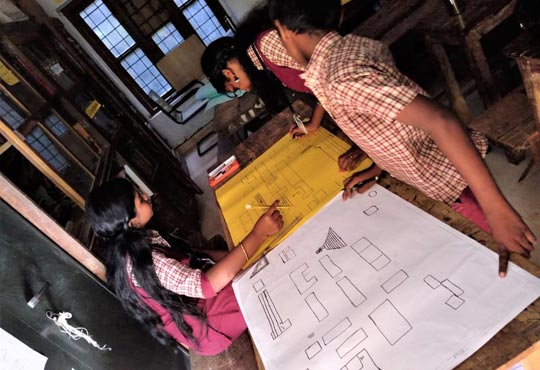
Students engaged in Participatory mapping exercise
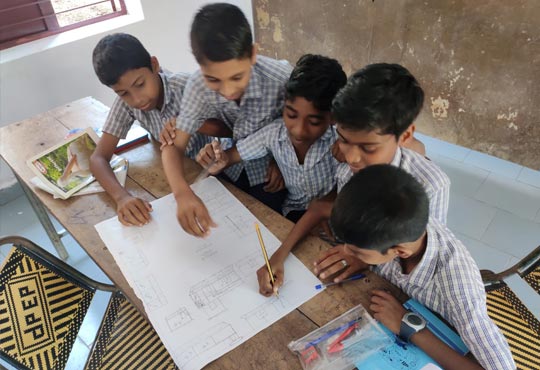
Students engaged in Participatory mapping exercise
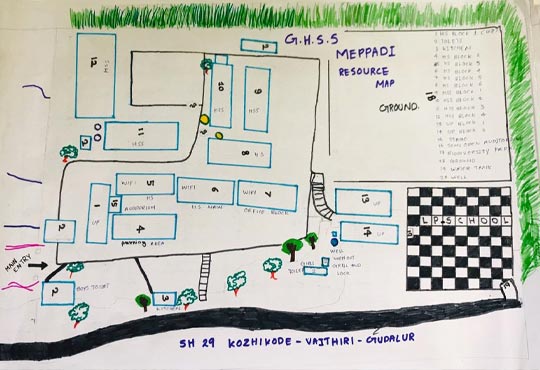
Resource map prepared by student group
@ Copyright 2020. All Rights Reserved - www.fdaction.org
